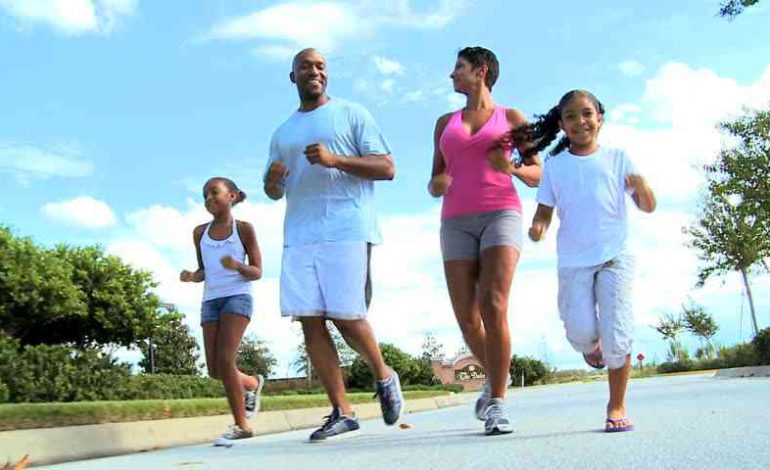Is exercise making you ill – WELL WOMAN

While research confirms that regular moderate exercise, say 40 minutes a day, can cut your risk of sickness by half, other studies show that strenuous exercise such as marathon training or excessive amounts of gym and cardio work can increase your risk of falling ill.
The main culprits are upper respiratory tract infections (URTIs), such as coughs, colds, sinusitis and tonsillitis. The average person gets at least one URTI a year, particularly during the cold rainy season, but these are prime causes of illness among people who train hard, such as runners and body builders. Researchers believe that intense workouts, extreme training schedules and regular participation in high demanding sports like running can suppress the body’s immune response.
If you regularly do moderate exercise such as 30 to 40 minutes of brisk walking or gym training four to five days a week, it won’t have much of an impact on your immune system. In fact, this is good for your immunity. But exercising for 90 minutes to two hours at an intensity above 70 per cent of your aerobic capacity will make you vulnerable to illness.
Moderate exercise is thought to boost the activity of germ-fighting natural killer (NK) cells, which help the body remove viruses and abnormal cells. But strenuous exercise, such as training for an endurance event, has been shown to suppress NK activity. Also, intense activity can be psychologically stressful. Mental strain increases levels of the stress hormone cortisol which, teamed with another exercise-induced stress hormone, adrenaline, regulates white blood cell function and causes a decrease in immunity.
Physical stress such as that experienced on a long duration high intensity exercise can cause a one-off dip in the immune system that suppresses it for a day or so. But repeated or chronic psychological stress seems to impact the immune system the most. Experts, however, say that your immune system will regain full strength after a brief window of time following the activity. The window, which is suppressed, lasts mostly 24 hours, but the time does vary because some cells are affected more than others.
Endurance competitors such as marathoners can expect every aspect of their immune system to take a blow for at least three to six hours after crossing the finishing line, with most racers being vulnerable to infection for a day or two afterwards. During this time, it is wise to support your system by getting plenty of sleep, eating well, resting up and avoiding contact with crowds of people.
Not all activities are health saboteurs. In fact, some workouts could keep you congestion free when there is a flu outbreak. A study from the Appalachian State University in the US shows those who exercise moderately often have 43 per cent fewer days with a cold in a year than their sedentary counterparts. If you exercise, you need to take certain precautions to ensure you remain healthy all year round.
If you are an outdoor exerciser
Cold and rainy months can be hard on those who love outdoor exercise. The cold and rain can suck the fun out of a workout and the chill can certainly give you a cold. Research suggests that people succumb to illness when temperatures are low.
Low temperatures increase URTIs in outdoor exercisers. Other factors play a role too – uncomfortable weather (whether too hot or too cold or raining) can cause psychological stress that releases the immune suppressing hormone cortisol, and many outdoor exercisers fail to eat enough food to fuel their outdoor workouts. Your body relies heavily on carbohydrates fuel in the cold, so your energy reserves may drain quickly on longer workouts in the cold. Advice: fuel up before, during and after.
If you are in a team
While intense and long workouts can depress immune function, netball, hockey and football games shouldn’t leave you reaching for the tissues. Most team games are intermittent – that is, sometimes you will need to sprint and other times you will be walking or jogging – and this seems to have less of an impact on immunity than doing continuously high-intensity exercise.
Infections among competitive athletes such as viral, fungal and bacterial outbreaks are normally caused by person-to-person contact. You should play smart if in a team game. As much as possible, avoid contact with unwell teammates and certainly don’t share drinks, bottles or, worse still, towels.
When you workout in the gym
Research shows that even intense resistance workout in the gym has little impact on immune function.
Scientists suspect that the recovery between sets gives the immune system a boost. Poor gym etiquette, however, may put your health at risk. You encounter disease-causing germs every day in the gym.
Many gym goers exercise with a cough or cold. Germs can easily be spread by unwashed hands, through direct contact with someone who is sick or through touching contaminated objects such as gym equipment. There are many bugs around a gym to be mindful of and you also need to be careful and mindful of other gym users. Wipe gym equipment before and after use, don’t share towels and toiletries, and try to avoid contact with frequently touched areas, such as door handles. Wear sandals in the shower and disinfect your hands as often as possible.







